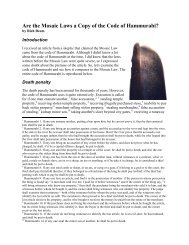Coming to Grips with the Early Church Fathers - Evidence for God ...
Coming to Grips with the Early Church Fathers - Evidence for God ...
Coming to Grips with the Early Church Fathers - Evidence for God ...
Create successful ePaper yourself
Turn your PDF publications into a flip-book with our unique Google optimized e-Paper software.
<strong>Coming</strong> <strong>to</strong> <strong>Grips</strong> <strong>with</strong> <strong>the</strong> <strong>Early</strong> <strong>Church</strong> Fa<strong>the</strong>rs’ Perspective on Genesis John Millam<br />
acknowledging that <strong>the</strong> early church fa<strong>the</strong>rs held <strong>to</strong> a “diversity of opinion” <strong>with</strong> respect <strong>to</strong><br />
Genesis 1–11. 2<br />
Bradshaw’s study reinvigorated my interest in <strong>the</strong> patristic view of Genesis. It did much <strong>to</strong><br />
correct and clarify my thinking, but <strong>the</strong>re was still much more <strong>to</strong> research. I soon realized that<br />
<strong>the</strong> only way <strong>to</strong> fully appreciate what <strong>the</strong>se ancient figures taught was <strong>to</strong> wade through <strong>the</strong><br />
original writings and study <strong>the</strong>ir his<strong>to</strong>rical context <strong>for</strong> myself. Moreover, it soon became clear<br />
that I also needed <strong>to</strong> include early Jewish writings in my study. The church was bir<strong>the</strong>d in a<br />
Jewish context, so some of <strong>the</strong>se works helped shape <strong>the</strong> church fa<strong>the</strong>rs’ thinking.<br />
The current scope of my research includes more than thirty early Jewish sources and fifty church<br />
fa<strong>the</strong>rs and so covers <strong>the</strong> majority of <strong>the</strong> relevant extrabiblical writings up <strong>to</strong> <strong>the</strong> fifth century.<br />
While <strong>the</strong> bulk of my research is first-hand reading, I do still read whenever possible what<br />
young-earth creationist writers have <strong>to</strong> say <strong>to</strong> insure that I don’t overlook relevant in<strong>for</strong>mation<br />
and <strong>to</strong> counter-balance my own old-earth perspective.<br />
Problems <strong>with</strong> Old-Earth Use of <strong>Early</strong> <strong>Church</strong> Fa<strong>the</strong>rs<br />
Mook begins his essay by criticizing those who argue that <strong>the</strong> early church fa<strong>the</strong>rs supported <strong>the</strong><br />
notion of “deep time” (i.e., an old earth) and o<strong>the</strong>r modern <strong>the</strong>ories. He identifies:<br />
1. William G. T. Shedd as claiming that some of <strong>the</strong> early church fa<strong>the</strong>rs taught a day-age<br />
view;<br />
2. Henri Blocher as writing that Augustine held <strong>to</strong> a view similar <strong>to</strong> <strong>the</strong> framework<br />
hypo<strong>the</strong>sis; and<br />
3. Arthur Custance as claiming that Origen held <strong>to</strong> <strong>the</strong> gap <strong>the</strong>ory. 3<br />
Mook’s rejection of <strong>the</strong>se specific claims as inaccurate is justified. This kind of misuse of <strong>the</strong><br />
patristic writings <strong>to</strong> support old-earth creationism is a common complaint echoed by o<strong>the</strong>r<br />
young-earth creationists, including Bradshaw.<br />
Mook also takes aim at Dr. Hugh Ross’ claims on this subject. Ross’ earliest statements claim<br />
that Irenaeus, Origen, Basil, Augustine, and Thomas Aquinas taught that <strong>the</strong> creation days were<br />
long periods of time, which Mook rejects as incorrect. 4 In later books, Ross has backed away<br />
from many of those claims but still argues that Justin Martyr, Irenaeus, and several o<strong>the</strong>rs taught<br />
that <strong>the</strong> days of creation were 1,000 years each. Mook concludes that while Ross become more<br />
nuanced in his claims, he remains substantially wrong. 5<br />
2. Robert I. Bradshaw, Creationism and <strong>the</strong> <strong>Early</strong> <strong>Church</strong>, last updated January 25, 1999,<br />
http://www.robibrad.demon.co.uk/Contents.htm, summary.<br />
3. James Mook, “The <strong>Church</strong> Fa<strong>the</strong>rs on Genesis, <strong>the</strong> Flood, and <strong>the</strong> Age of <strong>the</strong> Earth,” in <strong>Coming</strong> <strong>to</strong> <strong>Grips</strong> <strong>with</strong><br />
Genesis, eds. Terry Mortenson and Thane H. Ury (Green Forest, AR: Masters Books, 2008), 24.<br />
4. James Mook, “The <strong>Church</strong> Fa<strong>the</strong>rs on Genesis, <strong>the</strong> Flood, and <strong>the</strong> Age of <strong>the</strong> Earth,” 25–26.<br />
5. James Mook, “The <strong>Church</strong> Fa<strong>the</strong>rs on Genesis, <strong>the</strong> Flood, and <strong>the</strong> Age of <strong>the</strong> Earth,” 26.<br />
Page 2 <strong>Evidence</strong> <strong>for</strong> <strong>God</strong> from Science






